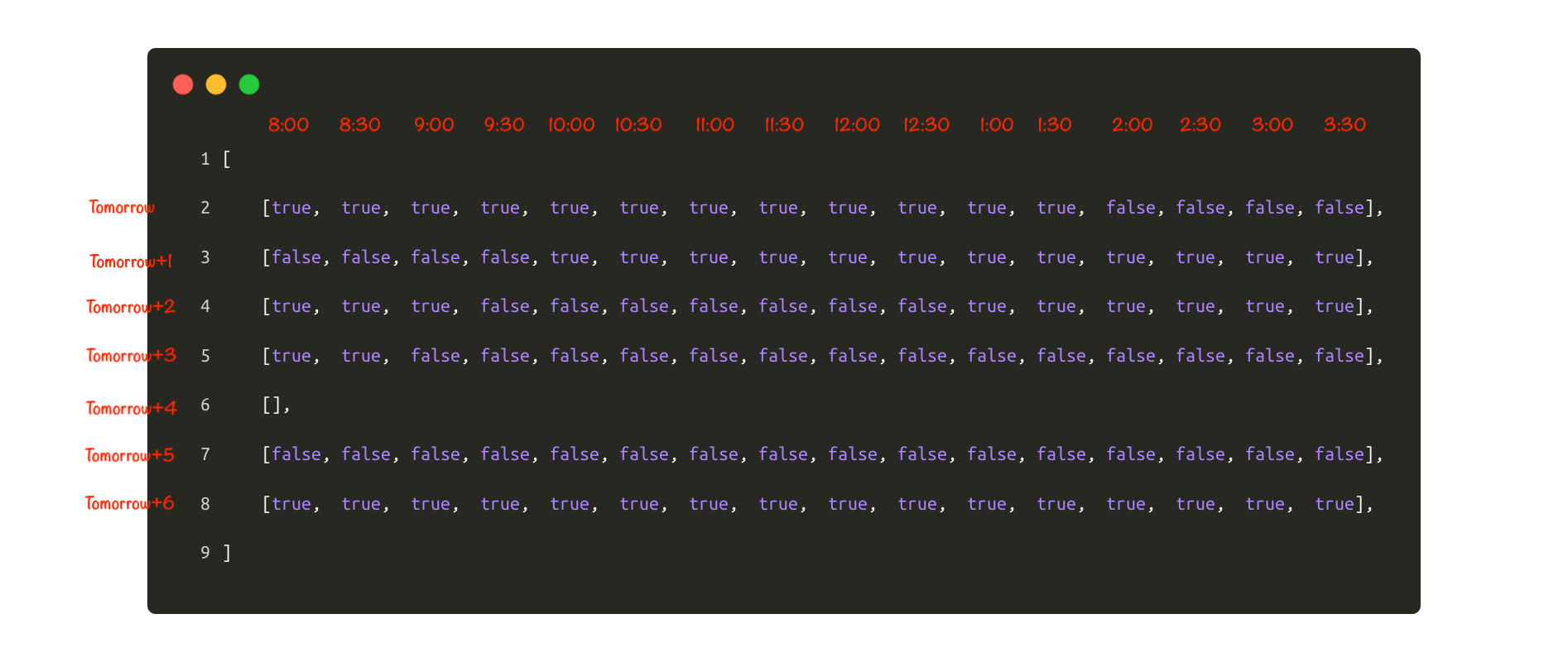Worst.API.Ever
Back when I was developing Android applications, the worst REST API I ever had to consume had a response that looked something like this:
[
[true,true,true,true,true,true,true,true,true,true,true,true,false,false,false,false],
[false,false,false,false,true,true,true,true,true,true,true,true,true,true,true,true],
[true,true,true,false,false,false,false,false,false,false,true,true,true,true,true,true],
[true,true,false,false,false,false,false,false,false,false,false,false,false,false,false,false],
[],
[false,false,false,false,false,false,false,false,false,false,false,false,false,false],
[true,true,true,true,true,true,true,true,true,true,true,true,true,true,true,true],
]
Allow me to explain:
- This API was used to retrieve available time slots in the upcoming week.
- Each nested array represents a day in the upcoming week. So for example: If today is Friday, then the array at index 0 represents Saturday.
- Each boolean in the nested array represents whether that half-hour time slot is available or not. The boolean at index 0 represents 8 AM.
I’ve attached a picture below to make the above explanation clearer:

The Android project used a tool to generate the client code and so there was no abstraction whatsoever. The UI code was working directly with this multi-dimensional array of booleans.
You don’t need me to tell you how ugly and complicated the code looked! There were for-loops all over to place to figure what the date was and what time slot each boolean corresponded to.
I just hoped I never had to touch the logic but I did and debugging could easily take days! There were no unit or integration tests in the project either!
At the time, I was working for a software agency and sometimes we had a little extra time on our hands.
We had a long term contract to maintain the application that consumed the API described above so I gave myself the task to add an abstraction layer. This is what I came up with:
public interface WeekSchedule{
@NonNull
Set<LocalDate> getUpcomingDays();
@Nullable
DaySchedule getScheduleForDate(@NonNull LocalDate date);
}
public interface DaySchedule{
@NonNull
Collection<TimeSlot> getTimeSlots();
boolean isWeekend();
boolean hasAvailabeSlots();
}
public interface TimeSlot{
@NonNull
LocalDateTime getStartTime();
@NonNull
LocalDateTime getEndTime();
boolean isAvailable();
}
Implementing the abstraction took one day and then it took another day to get the unit tests coverage up to 90+%.
After that, whenever I had time, I’d pick a screen in the booking journey to refactor!
Getting rid of that mess felt SO good! Suddenly the code became readable and easier to maintain. I just love replacing large swathes of code with a simple line or two. The unit tests even brought to light a corner case bug though I can’t remember what that was.
Key Takeaways
I think this story highlights the importance of 2 things:
Investing time to come up with the right abstractions:
This involves understanding the domain and its terminology so that you can use it correctly in the code.
When I worked in Banking, studying the ISO 20022 standard really helped me come up with better abstractions.
Not all developers have worked in Banking, so I feel this story is a good one to help communicate developers the value of understanding and using domain terminology
API-First development approach
A discussion between backend and front-end on the API contract before any development would have been an efficient use of time.